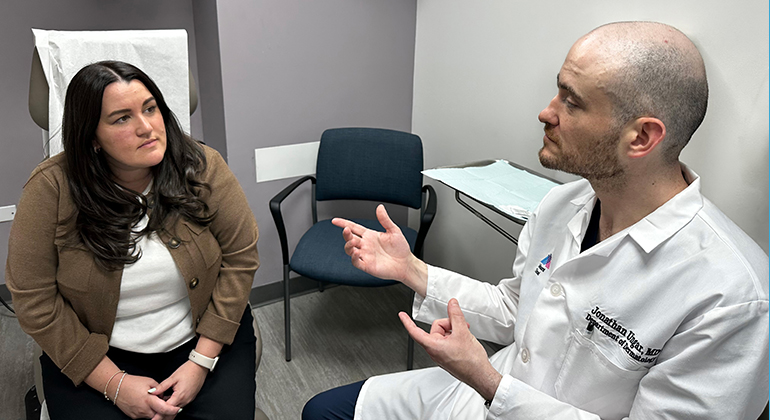
The Spot She Didn’t Ignore: A Case Study in Early Skin Cancer Detection
When a small mark appeared on Jacqueline Mills’ cheek, the 32-year-old teacher feared the worst, and with good reason. Though a dermatologist initially brushed off her concerns, Mills trusted her instincts and sought a second opinion at Mount Sinai, where her decision may have saved her life.
Thanks to the expertise of Dr. Jesse Miller Lewin, Director of The Kimberly and Eric J. Waldman Melanoma and Skin Cancer Center, Vice Chair of Surgical Operations, System Chief of the Division of Dermatologic & Cosmetic Surgery at Mount Sinai Health System, the mark was diagnosed as stage zero melanoma, an early and highly treatable form of one of the deadliest skin cancers.
“Trust your gut,” said Dr. Lewin. “If a lesion on your skin is new or changing and you are concerned, see a dermatologist. If you remain concerned, get a second opinion. Because Jacqueline did that, it saved her life.”
With melanoma known to spread rapidly, early detection is crucial. Mills underwent Mohs surgery, a precise procedure performed by Dr. Lewin that removed the cancer while preserving as much healthy tissue as possible. Though the original spot was tiny, the hidden spread required removal of a quarter-sized area from her face.
Today, Mills is cancer-free and says, “It was a blessing this was on my face. I saw the changes early. If it were anywhere else, I might have missed it.”
Dr. Lewin urges everyone to follow the ABCDEs of melanoma:
- Asymmetry
- Border irregularity
- Color variation
- Diameter over 6mm
- Evolution or change
Mills now gets twice-yearly checkups and recommends advanced tools like the Vectra WB360 scan, a 3D imaging system that uses more than 40 high-resolution cameras to quickly capture a complete visual record of the skin, including freckles, moles, and other lesions, all within a matter of minutes.
Melanoma makes up only about 1% of all skin cancer cases, but it causes most of the deaths linked to skin cancer, according to the American Cancer Society. In 2025, they estimate that around 104,960 people in the U.S. will be diagnosed with melanoma, and about 8,430 will lose their lives to it.
Melanoma is aggressive and can spread in as little as six weeks, which makes early detection critical. Jacqueline’s case is a powerful reminder that paying attention to subtle skin changes and acting quickly can be lifesaving.
To schedule a skin check with one of our dermatologists, call 212-241-9728.